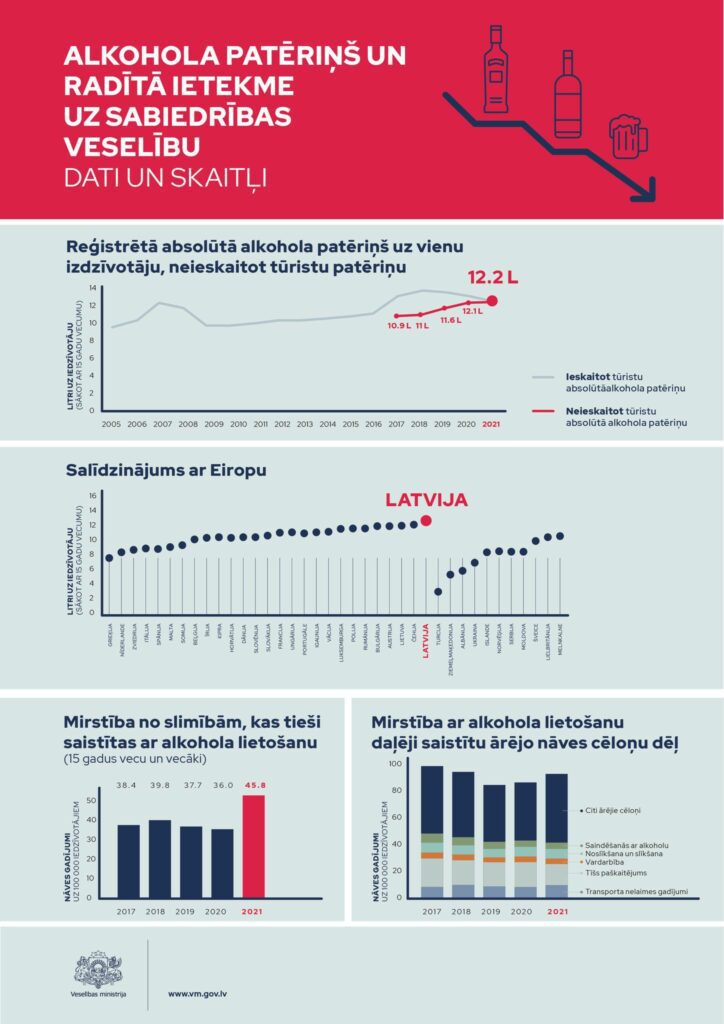High alcohol consumption and high alcohol harm
Alcohol harm in Latvia is a heavy burden on people and society.
In 2020, Latvia had the highest population-level alcohol consumption among the countries of the Organization for Economic Cooperation and Development (OECD) with 12.1 liters per inhabitant, excluding the consumption of tourists. In 2021, per capita alcohol continued to increase, reaching 12.2 liters.
As previously reported by LSM, Latvian households spend a larger proportion of their budgets on alcoholic beverages than people in other countries in the European Union. High laevels of alcohol consumption is driven by ultra cheap alcohol. Latvia has some of the EU’s lowest alcohol prices.
Latvians spent €951 million on booze in 2021, equivalent to 2.8% of GDP. That represents 5.0% of total consumption expenditure, making it proportionally the country where households spend more on alcohol than anywhere else in the EU.
The Health Ministry has calculated that in 2021 alcohol harm caused healthcare costs of €56.6 million for the direct treatment of alcohol-caused issues.
Movendi International has been reporting on the alcohol harm and policy situation in Latvia with nearly 30 articles in recent years.
The picture that emerges is clear:
Latvia ranks among the countries with the highest rate of years of life lost due to alcohol, according to the World Health Organization. Alcohol harm is pervasive and massive.
Alcohol is a significant risk factor for various injuries, including life-threatening conditions. The Latvian Emergency Medical Service (NMPD) reported that one in three injured Latvians is under the influence of alcohol.
Apart from causing injuries, alcohol intoxication makes it more difficult and dangerous for emergency and medical staff to provide proper help.
In 2022, Movendi International developed a deep dive into the alcohol harm and policy situation in Latvia to shed light on how alcohol harm and alcohol prevention developed over the years. It illustrated that there is urgent need, considerable potential, and clear opportunity for Latvia to improve alcohol policy to increase the health, social, and economic development of the country.
Making alcohol policy a national priority
That is why the Ministry of Health is now taking action. The government wants to reduce the overall level of alcohol consumption to prevent and reduce alcohol-related diseases and deaths, such as liver cirrhosis, traffic accidents, drowning, injuries, suicides, and more.
And people want alcohol policy to become the priority it should be.
A survey from the Disease Prevention and Control Center in 2020 showed that 69% of Latvian people want alcohol advertising to be banned in general. 66% of respondents said advertising of special offers for alcoholic beverages and sales of alcoholic beverages should be banned, according to Latvia’s public broadcaster LSM.
In order to achieve the goals, it is necessary to implement complex measures that affect not only restrictions on the advertising and availability of alcoholic beverages, but also ensure public awareness of the effects of alcohol consumption on health, as well as adequate health care for people with substance abuse disorders,” explained Jana Feldmane, director of the Public Health Department of the Ministry of Health.
The draft laws are only part of a set of complex measures, which the Ministry of Health has started to implement. Currently, the Ministry of Health is conducting a study “On alcohol use, its consequences and the economic benefits of prevention in Latvia”.
Jana Feldmane, director, Public Health Department, Ministry of Health, Latvia
Concrete alcohol policy solutions
Key aspects of the proposed measures include:
- Banning price reductions and special offer commercials for alcoholic beverages across various media forms.
- This helps to denormalize alcohol and supports wider efforts to prevent and reduce alcohol harm.
- Banning the supply of alcohol in trade with other goods or services at a more favorable price, and offer alcohol as a taste sample (except at retail) for free, as a gift or as compensation for the purchase of another product or receipt of a service.
- Introducing pictograms on alcoholic beverages, advising against alcohol consumption during pregnancy and while driving.
- This long-overdue measure, along with providing labeling information about ingredients, nutritional and energy value, provides important information and awareness of alcohol’s risk at the point of sale.
The new amendments to the Law on the Circulation of Alcoholic Beverages and the Law on Electronic Media indicate that all alcoholic products will have to include nutritional information on their labels; there would be a ban on free alcohol at gambling halls; advertising would be limited, and small (0.2 l) PET packages of strong alcoholic drinks (over 22% alcohol) would be banned.
The alcohol industry lobbied against these amendments and called them “incomplete” and “pointless”. Alcohol producers and advertisers keep ignoring Latvia’s alcohol burden and remain critical of the effort to promote health and well-being, according to LSM.
Prime Minister Krišjānis Kariņš said that at the meeting, “hairs were being split” over amendments prepared over the course of two years, at a time when the government should be working on “important issues regarding Latvia’s economic transformation”.
I am a bit ashamed and a bit angry,” said Prime Minister Kariņš, as per LSM.
Krišjānis Kariņš, Prime Minister, Latvia
In the end, the amendments were supported and will be reviewed in the parliament.
Source Website: Ministry of Health, Latvia [Translated from Latvian]

